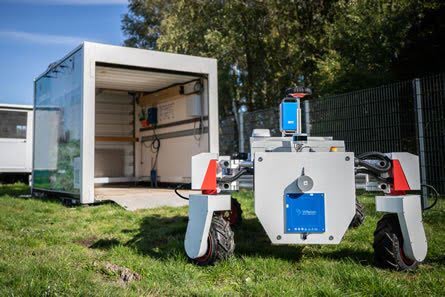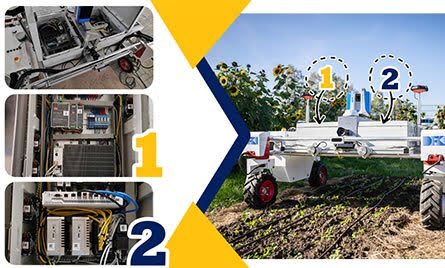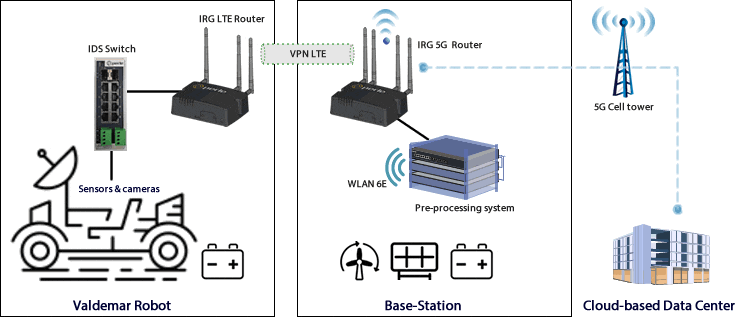Perle IRG Routers and IDS Switches are used in the creation of virtual reality (VR) environments
The German Research Center for Artificial Intelligence chose Perle’s ultra-low-power products that are ideal for use in battery-powered applications
PRINCETON, N.J. (March 07, 2023) Researchers at the German Research Center for Artificial Intelligence (DFKI, Deutsches Forschungszentrum für Künstliche Intelligenz) are developing a virtual breeding garden to test the use of automation and virtual reality (VR) as part of the research project PORTAL (28DK111B20) founded by the German Federal Ministry of Food and Agriculture. The project is intended to optimize and reduce the cost of crop variety plot trials, which are used by seed manufacturers to assess and develop sustainable types that are disease resist and deliver the best yield.
The use of VR technologies opens several new possibilities, such as the immersive inspection of the plots, regardless of the trial location and cultivation period. Furthermore, the rating of plants in a virtual breeding garden opens the potential for interactive machine learning since the information can be saved and labeled for the creation of data sets. Automation or recommendation systems can be developed on this basis.
DFKI has created a mobile sensing platform that consists of a battery-operated robot based on the Saga Robotics Thorvald Platform, named Valdemar, and a base-station container where Valdemar is protected from storms and vandalism while it uploads data and recharges the battery. Valdemar can travel over 4km in a recording campaign, covering an area of approximately 6,000m2, to capture around 2 Terabytes of data about plants at various stages of development using multiple sensors and cameras. This data is compressed and processed within the base-station container and then uploaded to the cloud-based data center over 5G for further processing to create a three-dimensional map of the breeding garden within a VR environment.

In the development phase of Valdemar, the team at DFKI selected IDS-305-XT Industrial Ethernet Switches to connect sensors and cameras for data collection. The compact size of the IDS-305 fit perfectly into the constrained space, while its industrial design enabled reliable operation in this environment that is subjected to vibration, shock, and -40°C to 75°C temperatures. The IDS-305-XT plays a critical role in the backbone network by enabling real-time clock synchronization of individual control components and ProfiNet support for the integration of a fail-safe PLC.
The second issue was the data upload to the base-station container followed by transmission to the cloud-based data center.

Because Valdemar is battery operated, and the base-station container is solar and wind-powered, the equipment installed needed to consume as little power as possible. For this job, we tested cellular routers from Perle, Cradlepoint, and Sierra Wireless. Perle’s power consumption was half of the competitive products. That, along with the fact that Perle did not have the SIM card recognition issues that we experience with the others, made our decision to choose the IRG Routers easy.
An IRG5541+ LTE Router is installed on Valdemar and an IRG7440 5G Router is located inside the base-station to maintain a continuous VPN LTE connection between the robot and the container.
When Valdemar returns to base-station container, the data is automatically transferred using a local WLAN 6E network. The base-station processing equipment compresses and reduces the data before it is uploaded to the cloud-based data center overnight using the Perle IRG7440 5G Router.

The German Research Center for Artificial Intelligence (DFKI) has operated as a non-profit, Public-Private-Partnership (PPP) since 1988. Today, it maintains sites in Kaiserslautern, Saarbrücken, Bremen, Niedersachsen, laboratories in Berlin and Darmstadt, as well as branches in Lübeck and Trier. DFKI combines scientific excellence and commercially-oriented value creation with social awareness and is recognized as a major Center of Excellence
by the international scientific community. In the field of artificial intelligence, DFKI has focused on the goal of human-centric AI for more than 30 years. Research is committed to essential, future-oriented areas of application and socially relevant topics. Currently, with a staff of about 1,460 employees from more than 65 countries, DFKI is developing the innovative software technologies of tomorrow. The financial budget was 76.3 million euros in 2021.

